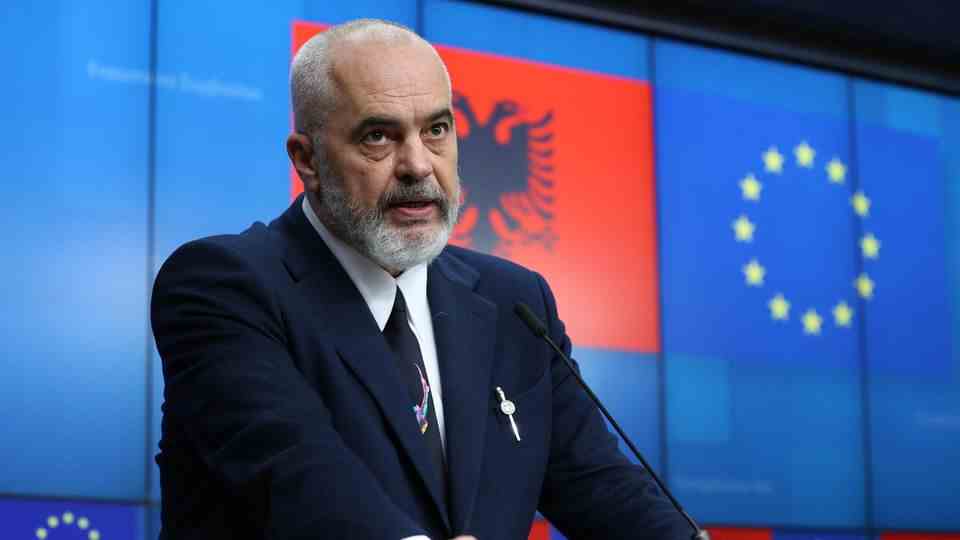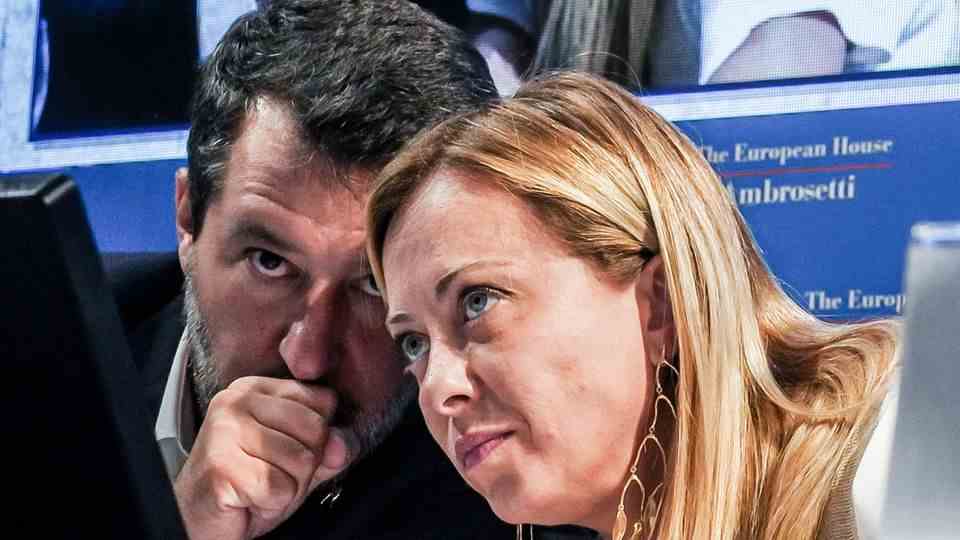elections in Italy
No to Europe – Why electing right-wing parties would weaken the EU
The right-wing populist Matteo Salvini (left) and Hungary’s head of state Viktor Orbán get along well. But many people fear that the EU will be undermined by politicians like her.
© REUTERS/Bernadett Szabo
Italy is facing a landmark election, with three centre-right parties wanting less European cooperation. The camp is currently leading in the polls. Should it win, things would change, and not just for Italy.
Italy is facing a sharp shift to the right – and Europe is nervous about the forthcoming parliamentary elections in the Mediterranean country. “We are concerned,” says former EU Commissioner and experienced Italian MEP Emma Bonino, reporting unease in other capitals as well. The reason for this has three names: Giorgia Meloni, Matteo Salvini, Silvio Berlusconi. The three party leaders of the centre-right bloc have a good chance of a landslide victory in next week’s (September 25) elections in Rome.
Election in Italy: right-wing parties lead in the polls
Above all, Meloni from the extreme right-wing Fratelli d’Italia (“Brothers of Italy”), who clearly leads the polls and has the best chance of becoming prime minister, worries many. The Roman doesn’t think much of the EU, regularly scolds the “bureaucrats from Brussels” and bases her ideas on countries like Hungary and Prime Minister Viktor Orbán, who is a friend of hers.
The fact that Meloni’s coalition partners – ex-Prime Minister Berlusconi and right-wing populist Salvini – have maintained close ties with Russia and Vladimir Putin for years is increasing the unrest in Europe. Because they are struggling for unity on the side of Kiev in the Ukraine war.
Matteo Salvini doubts Russia sanctions
Salvini publicly doubts the effectiveness of the sanctions against Russia and thus blames the EU for the dramatic increase in energy costs. The head of the Lega has not hidden his attitude towards Moscow in recent years. He once slipped on a Putin fan shirt on Red Square and even in the European Parliament. In 2015, Salvini said he would trade two Mattarellas for half a Putin — Sergio Mattarella is Italy’s president.
This week, focus immediately shifted to Salvini and the Lega when an intelligence report emerged in the US that Russia had been paying foreign parties for years. Salvini promptly dismissed the fact that he “never asked for or received any money, no rubles, euros, dinars or dollars”. Berlusconi also said he was “of course” not involved in the scandal – in 2010 he had described his good friend Putin as a “gift from heaven”.
How dangerous can Meloni and her legal alliance Europe really be? “I don’t believe that Giorgia Meloni poses a threat to the stability of the EU,” says political scientist Andrea Ungari from the Luiss University in Rome. “Italy has its place in Europe. It’s also different when you speak from the opposition or when you sit down at a table with all the EU heads of state and government.”
Critics: “Meloni ate chalk”
In fact, since the fall of Mario Draghi’s government in July, Meloni has been trying to appear moderate, reliable and even supportive of the state. She sent video messages explaining in English, Spanish and French that concerns abroad were unfounded and that Italy remained a strong partner under her.
Critics say Meloni ate chalk. And indeed, the tone became rougher this week. At an election rally in Milan, she called out to supporters that the “fun” was over in Europe. With her at the helm, Italy will again first pursue its own interests and only then think in European terms.
The announcement was not surprising. Meloni wants to “risollevare” Italy, that is, to get it back on its feet, as the Fratelli d’Italia election posters say. Memories of Donald Trump’s slogan “Make America Great Again” come to life. In the first sentence of the joint election manifesto, the centre-right announces a foreign policy “focused on the national interest and the defense of the homeland”. Meloni wants EU law to be brought back under national law. She wants strong nation states instead of a union.
Hungary’s head of state Orban is pleased with the shift to the right
That is entirely to the liking of Hungary’s Prime Minister Orban – whose country can no longer be regarded as a full-fledged democracy, according to a report by the European Parliament – and the national-conservative PiS party from Poland. After the right-wing populist Sweden Democrats are likely to come to power in the Scandinavian EU country, Italy would have the fourth right-wing government in the Union.
“This will make Europe weak,” fears MEP Alexandra Geese from the Greens. These countries wanted to prevent a Europe of nations and a common, strong European policy, says Geese of the German Press Agency. She has lived in Italy for more than 20 years and finds the development “very worrying”.
Right-wing politician: “No to the bureaucrats in Brussels!”
Meloni wants to strengthen the “Atlantic” connection to the USA – Europe is of secondary importance to her. “Yes to the sovereignty of the people! No to the bureaucrats in Brussels!” she shouted into the microphone at an event organized by the far-right Spanish party Vox in June.
In Italy, many now fear that reforms could be stopped under Meloni, the prerequisites for the complete payment of the 192 billion euros from the EU recovery fund. The money is urgently needed – but Meloni wants to renegotiate with Brussels. But even the critics of the 45-year-old are not assuming that the new government will miss out on billions in aid.



